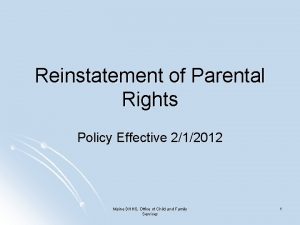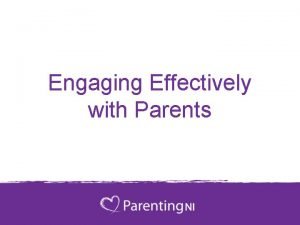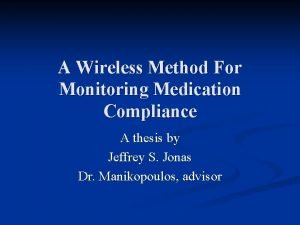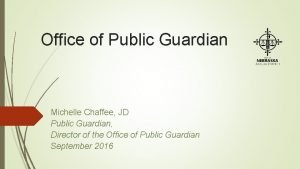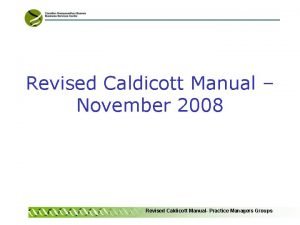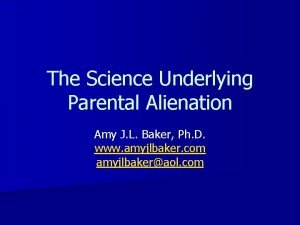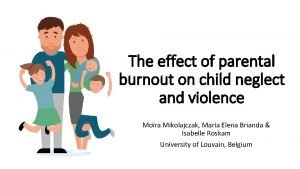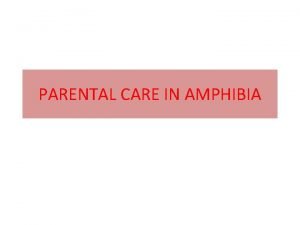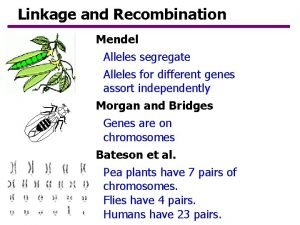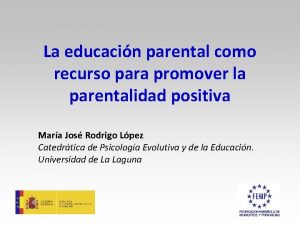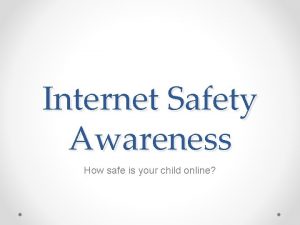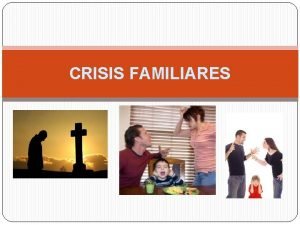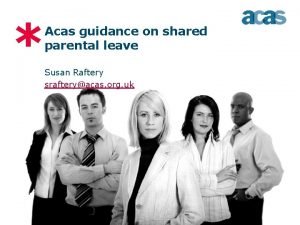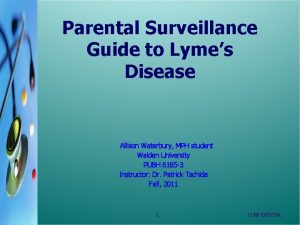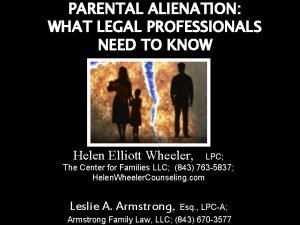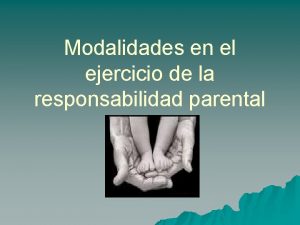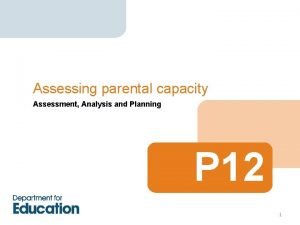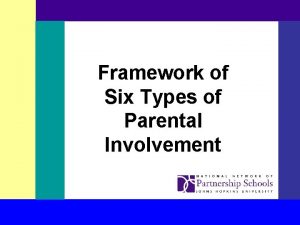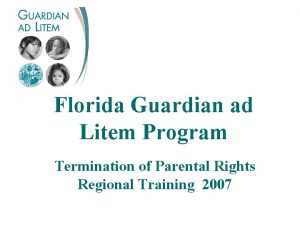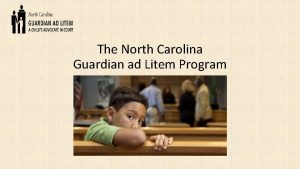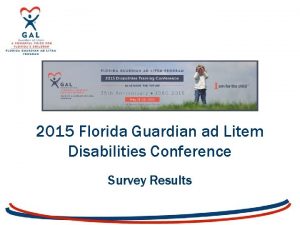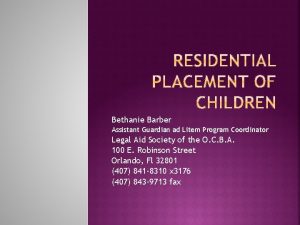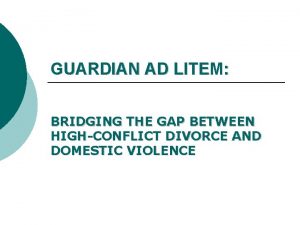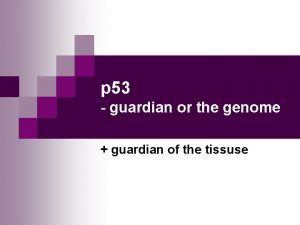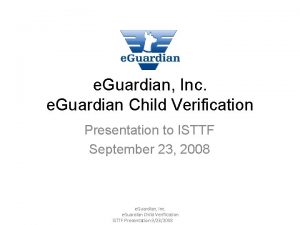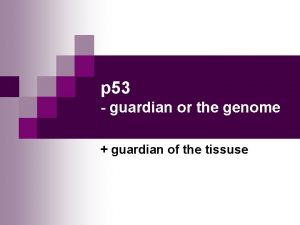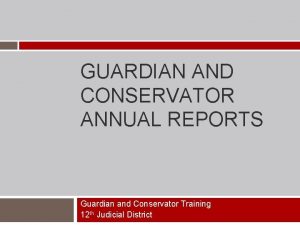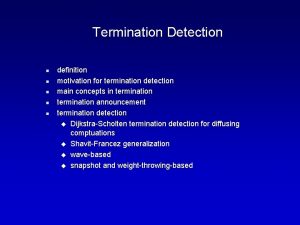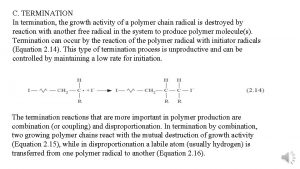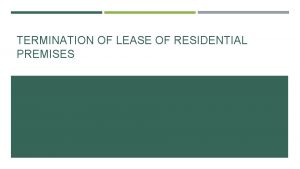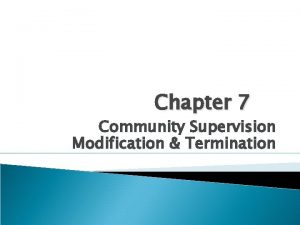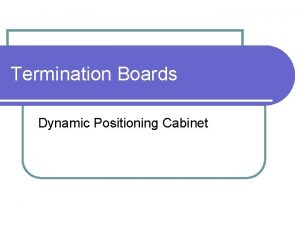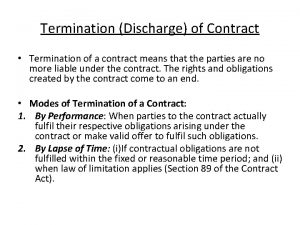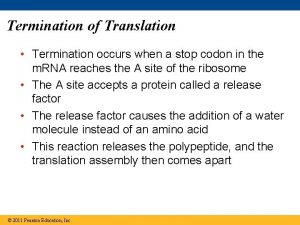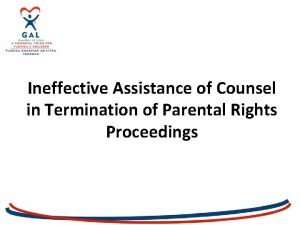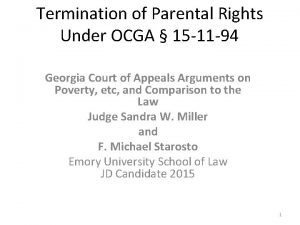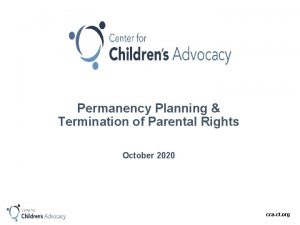Florida Guardian ad Litem Program Termination of Parental

















































- Slides: 49

Florida Guardian ad Litem Program Termination of Parental Rights Regional Training 2007

TPR = Statutory Ground (+) MBI (+) LRM • Clear & Convincing Evidence • TPR Grounds Exist • Manifest Best Interests • Least Restrictive Means

TPR Statutory Grounds § 39. 806 • Voluntary Surrender • Abandonment a b • Conduct towards child and continued involvement threatens life, safety, wellbeing irrespective of services c • Incarceration d

TPR Statutory Grounds§ 39. 806 • Case Plan Filed, Approved and Child Continues to be Abused e • Egregious conduct; failure to prevent egregious conduct, that threatens the life, safety, or physical, mental or emotional health of the child or the child’s sibling f

TPR Statutory Grounds § 39. 806 • Subjected child to Aggravated Child Abuse, g Sexual Battery, Sexual Abuse or Chronic Abuse • Committed Murder or Voluntary Manslaughter of a Child h • Involuntary TPR of a Sibling i

Review the Petition

Review the TPR Petition with Team Be sure petition contains facts alleging: • Grounds for TPR • Parents informed of right to counsel • Child dependent (if required) • Manifest Best Interests

Grounds for Termination of Parental Rights

a Voluntary Surrender § 39. 806(1)(a) • Written • Consent • Department to take custody • Not under fraud or duress

b Abandonment § 39. 806(1)(b) • While being able; AND • No effort to support; AND • No communication; OR • Marginal efforts at parenting = sufficient to evince a willful rejection of parental obligation OR

Abandonment § 39. 806(1)(b) Continued • Location of parent unknown • Cannot be ascertained by diligent search • Within 60 days

Abandonment § 39. 806(1)(b) Continued • Incarceration may only be a FACTOR to consider “together with other facts” including: • Multiple and habitual • Heinous nature of crime • Long incarceration foreseeable

c Conduct towards child and continued involvement threatens life, safety, well -being despite services § 39. 806(1)(c) • Provision of services; AND • Harm; AND • Futility – no reasonable basis to believe parent would improve • Do not need dependency adjudication or 12 months

d Incarceration § 39. 806(1)(d) • Substantial portion of child’s remaining minority § 39. 806(1)(d)1; OR • Certain crimes § 39. 806(1)(d)2; OR • Continued parent child relationship harmful to child § 39. 806(1)(d)3

Incarceration § 39. 806(1)(d) • What is Substantial Period of Time? • 25 - 32 percent of child minority is not substantial portion • B. C. v. Florida Dept. of Children and Families, 887 So. 2 d 1046 (Fla. 2004)

e Child continues to be abused, neglected, or abandoned by the parents. § 39. 806(1)(e) • Adjudicated dependent; AND • Case Plan filed; AND • 12 or more months • Failure to substantially comply; OR • Material Breach § 39. 806 (1)(e)2

Failure cannot be because of: • Parent’s lack of financial resources • Department’s failure to make reasonable efforts to reunify

f Definitions • Sibling means another child who resides with or is cared for by the parent regardless of whether the child is related • Egregious means deplorable, flagrant, or outrageous. Can be only once if such intensity, magnitude, or severity as to endanger the life of the child.

f Egregious conduct, or had the opportunity and capability to prevent and knowingly failed to prevent egregious conduct that threatens the life, safety, or physical, mental or emotional health of the child or the child’s sibling § 39. 806(1)(f)

Egregious Conduct • Must have hurt the child or put the child at imminent risk of harm • Commit or failed to prevent • Knew of previous abuse and did nothing

Egregious Conduct Failure to Protect Can be Enough

Egregious Conduct Towards Sibling Nexus Required • Nexus is required between the abuse of one child and the prospective abuse of a sibling

g Aggravated child abuse; sexual battery or sexual abuse; or chronic abuse § 39. 806(1)(g) • Aggravated child abuse defined in § 827. 03 • Sexual battery or sexual abuse defined in § 39. 01 • Chronic abuse defined in In re D. A. D. “long duration or frequent occurrence” “always present or encountered” and “being such habitually”

h Committed murder or voluntary manslaughter of a child § 39. 806(1)(h)

i Involuntary TPR of sibling § 39. 806(1)(i) • Prior involuntary TPR of sibling • Substantial risk of significant harm

Single Parent Terminations • Even if a two (or more) parent termination, be sure that evidence supports a TPR as to each and every parent • Final order should contain findings to support single parent termination

Single Parent Terminations Best Practice • Request that the court make findings under Section 39. 811(6) as to each parent in all cases, if it can be supported by record/evidence • Review Single Parent TPR training available on the website www. Guardianadlitem. org

Manifest Best Interest

Manifest Best Interest (MBI) • Court must make specific finding that TPR is in the child’s manifest best interest § 39. 810(1)-(11) • The final judgment is subject to reversal if no MBI on the record

Manifest Best Interest (MBI) • Each child individually • Review MBI questions with GAL • If consent by default still need MBI testimony • Not a comparison between placement and parents

Manifest Best Interest 1. The availability of a suitable relative exists who is not willing to adopt but who is willing to provide a permanent placement § 39. 810(1) 2. The ability and disposition of the parent or parents to provide the child with food, clothing, medical care … and other material needs of the child § 39. 810(2)

Manifest Best Interest 3. The capacity of the parent or parents to care for the child …§ 39. 810(3) 4. The present …needs of the child and … future needs§ 39. 810(4) 5. [E]motional ties …harm to the child …from the termination of parental rights. . . § 39. 810(5)

Manifest Best Interest 6. The likelihood of an older child remaining in longterm foster care § 39. 810(6) 7. Bond between child and “parental substitute” § 39. 810(7) 8. The length of time that the child has lived in placement and desire for continuity § 39. 810(8)

Manifest Best Interest 9. The depth of the relationship existing between the child and the present custodian§ 39. 810(9) 10. Child’s wishes § 39. 810(10) 11. Guardian ad Litem recommendations§ 39. 810(11)

Least Restrictive Means

Least Restrictive Means Padgett Test • Good faith effort to rehabilitate the parent and reunite the family • Measures short of termination should be utilized if … can permit the safe re-establishment of the parent-child bond

Least Restrictive Means Padgett Test “Relative Issue” goes only to MBI not Least Restrictive Means

Most Common Reversals Insufficient evidence of harm • Evidence not Clear and Convincing • GAL testimony insufficient • Therapist testimony not provided

Most Common Reversals Insufficient Evidence of Provision of Services • Incarceration Cases • Mental Illness

Common Issues Proving Harm • Bad acts alone are not enough • Substance abuse without harm not enough

Common Issues Proving Harm (Continued) • GAL testimony (improvements since removal) • Developmental delays • Medical problems • Educational problems • Therapist testimony

Common Issues Domestic Violence • Child is a witness of physical or verbal abuse • May not have to show that child witnessed the D. V – only that the child was affected by D. V. • Child is aware of DV www. guardianadlitem. org for complete DV explanation

Common Issues Hearsay • If it is reliable and trustworthy + child testifies (subject to cross-examination), or • If it is reliable and trustworthy + child does not testify + there is other corroborating evidence • See Evidence Training on www. guardianadlitem. org for full explanation

Post Trial Issues • Timely submission of final judgment • Accuracy of final judgment • Grounds • Manifest Best Interests • Least Restrictive Means • Findings as to Single Parent

Appeals • Notify Appellate Team of Appeals

TPR Training Materials Go to the P Drive to find TPR Training Power Point Presentation TPR Checklist TPR Evidence Chart MBI Chart TPR Grounds Case Summaries

www. Guardianad. Litem. org Resources By Topic Conferences & Training

www. Guardianad. Litem. org Searchable Case Summaries Case Summary by Topic Sign up to receive Legal Briefs Newsletter

 Termination of parental rights maine
Termination of parental rights maine Contrle parental
Contrle parental Contrle parental program
Contrle parental program Mobile guardian
Mobile guardian Finding nemo call to adventure
Finding nemo call to adventure How to cite the guardian apa
How to cite the guardian apa Es verdad no es un cuento hay un angel guardian
Es verdad no es un cuento hay un angel guardian No duerme el que cuida a israel
No duerme el que cuida a israel Threshold guardian archetype
Threshold guardian archetype Herald archetype examples
Herald archetype examples Guardian cancer policy
Guardian cancer policy Russell and atwell guardian
Russell and atwell guardian Giant worldwide 5 voices test
Giant worldwide 5 voices test Guardian schools jobs
Guardian schools jobs Guardian consonant
Guardian consonant The guardian
The guardian Qué es metáfora
Qué es metáfora Nt myers briggs
Nt myers briggs Poetic devices in beowulf
Poetic devices in beowulf Where was tim winton born
Where was tim winton born Rave mobile safety app
Rave mobile safety app Psc-cuny welfare fund retirees
Psc-cuny welfare fund retirees Who is the threshold guardian in the lion king
Who is the threshold guardian in the lion king Guardian rfid compliance monitor
Guardian rfid compliance monitor Threshold guardian
Threshold guardian Office of public guardian nebraska
Office of public guardian nebraska Angel of god my guardian dear
Angel of god my guardian dear Hypro esi nozzle chart
Hypro esi nozzle chart Caldicott guardian manual
Caldicott guardian manual The crossroads archetype examples
The crossroads archetype examples Amy baker parental alienation
Amy baker parental alienation What does burnout feel like
What does burnout feel like Recombinant vs parental
Recombinant vs parental Parental care in amphibians
Parental care in amphibians Mid parental height plotting
Mid parental height plotting Ma tefra
Ma tefra Parental vs recombinant
Parental vs recombinant Programas de educación parental
Programas de educación parental Akuakultur
Akuakultur Bt parental pin
Bt parental pin Crisis familiares ejemplos
Crisis familiares ejemplos Acas paternity leave
Acas paternity leave Male parental investment
Male parental investment Parental surveillance
Parental surveillance Parental alienation lawyer logan county
Parental alienation lawyer logan county Ejercicio de la responsabilidad parental
Ejercicio de la responsabilidad parental Parental capacity example
Parental capacity example Pedigree chart symbols
Pedigree chart symbols Six types of parental involvement
Six types of parental involvement Ciclo vital familiar
Ciclo vital familiar
